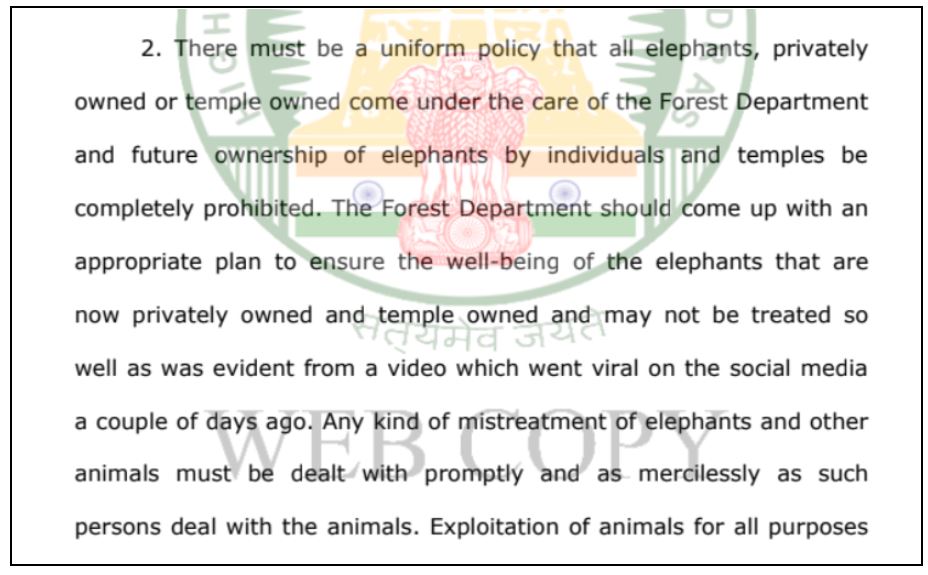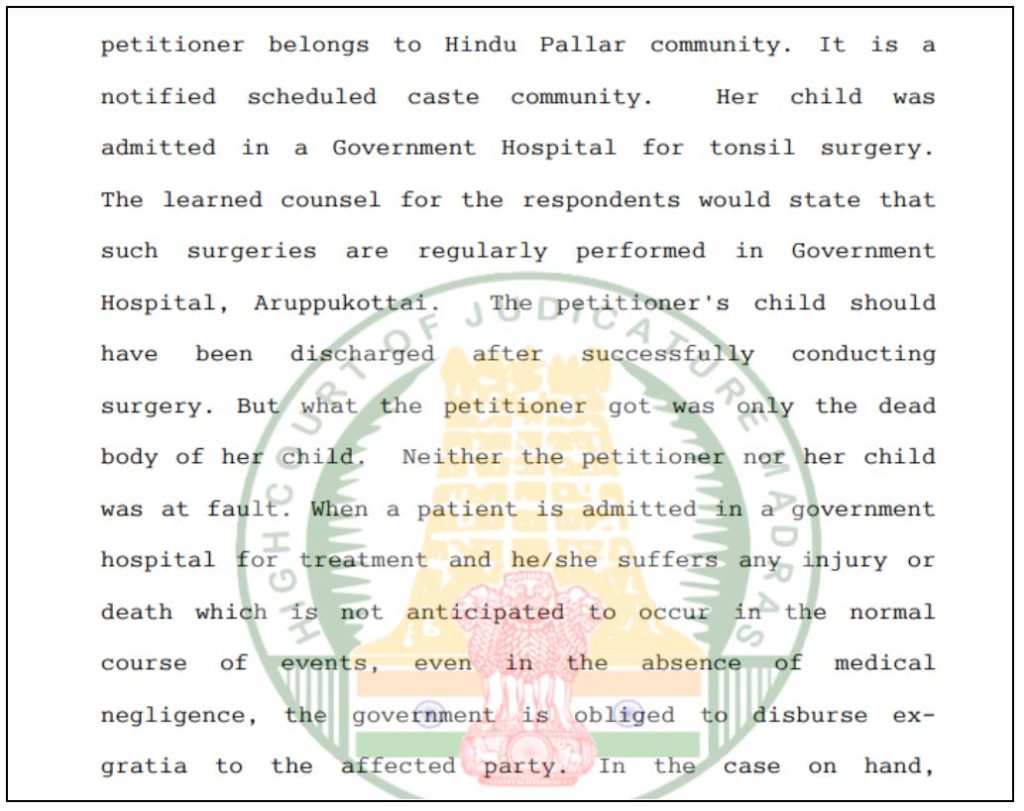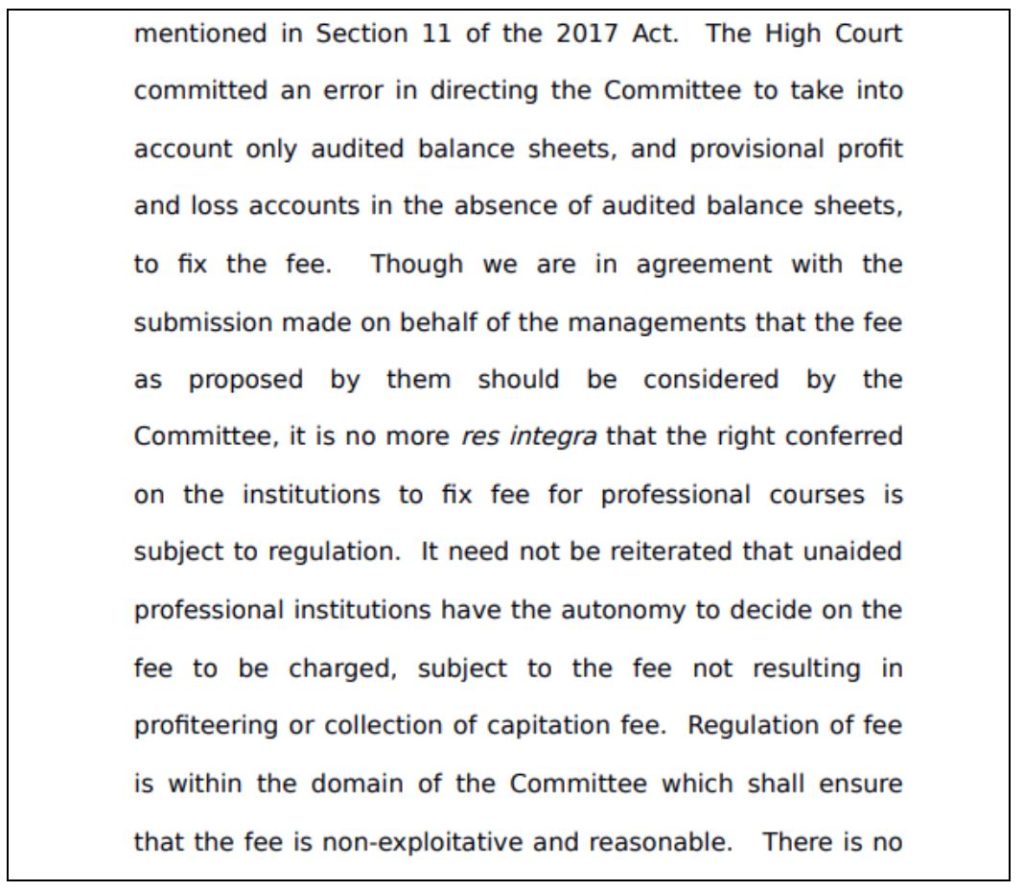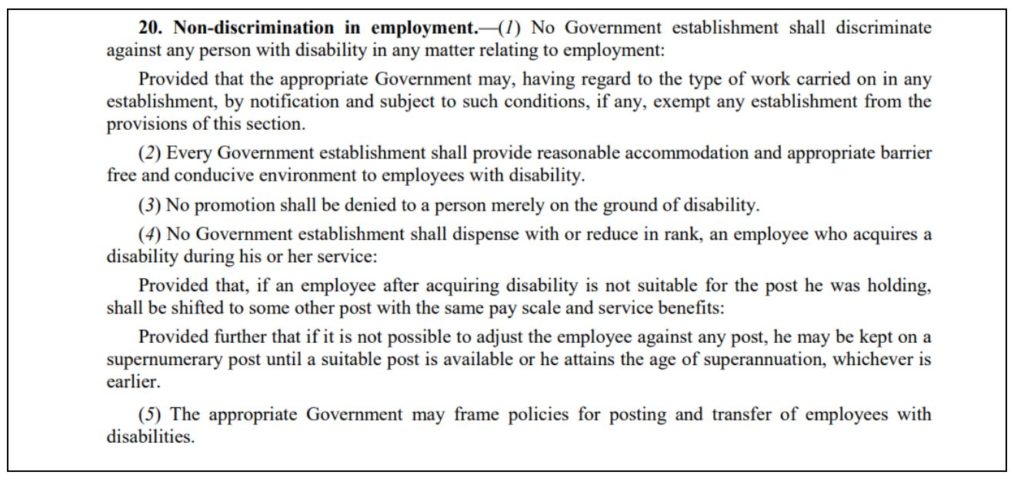In this round-up of important court decisions, we look at decisions about the exploitation of animals, compensation for unforeseen death or injury in a government hospital, regulation of fees charged by private medical colleges, and the Rights of PwDs.
Madras HC: Exploitation of animals for all purposes should be stopped.
In the case Rangarajan Narasimhan v. Chief Secretary & Ors., the Madras high court directed the state government to develop an appropriate plan to ensure the well-being of the elephants.
The court was hearing the matter pertaining to temple elephants and other elephants owned by private individuals, used by their owners to be exploited for joy rides or used as beasts of burden or to transport heavy material.
The court held that there must be a uniform policy that all elephants, privately owned or temple owned come under the care of the Forest Department and future ownership of elephants by individuals and temples be completely prohibited.

The bench of Chief Justice Sanjib Banerjee and Justice Senthilkumar Ramamoorthy directed the Forest Department to come up with an appropriate plan to ensure the well-being of the elephants that are now privately owned, and temple owned and may not be treated so well as was evident from a video which went viral on the social media a couple of days ago.
In conclusion, the court directed that exploitation of animals for all purposes should be stopped except for limited government-controlled exercises say, horse-riding or camel-riding on the beach, but even these cannot be privately operated since the treatment of the animals cannot be checked or monitored. The judgement also included that elephants, which have been lured away from the forest, should be rehabilitated and future measures put in place so that the animals are not exploited any further.
Madras HC: State has to compensate unforeseen death or injury in government hospital even if there is no medical negligence
In the case Tamil Selvi v. State of Tamil Nadu & Ors., the Madras high court held that when a patient is admitted to a government hospital for treatment and they suffer any unanticipated injury or death, the government is obliged to disburse ex-gratia to the affected party.
The petitioner’s daughter, about eight years, was suffering from tonsils and in April 2016, she was admitted to Government Hospital, Aruppukottai. For preparing the child for surgery, anesthesia was administered, and she developed some complications while being shifted to Rajaji Government Hospital, Madurai for further treatment. She went into a coma and eventually passed away on 05 July 2016. The petitioner alleged that the death of the child was purely due to medical negligence and has filed a writ petition demanding payment of compensation.
Following the complaint, an enquiry was conducted by a four-member enquiry committee. The report was submitted in June 2016 which stated that there was no medical negligence on the part of the doctors. The child was administered a drug known as Propofol. While propofol is not an intrinsically dangerous drug, there may be implications for children with mitochondrial diseases. However, there was nothing on the child’s medical records to indicate that she suffered from the said disease when she was being admitted to the hospital.
Upon examining all submissions, the bench of Justice GR Swaminathan observed that there are always instances when a drug does not accord with the body of the patient and leads to unfortunate complications. The present case on hand appears to be one such.

In conclusion, the judgement rejects the allegation of medical negligence but upholds the right of the petitioner to be compensated for the loss of their child in a government hospital with a sum of Rs. 5 lakhs. The judgement establishes that when a patient is admitted to a government hospital for treatment and suffer any injury or death which is not anticipated to occur in the normal course of events, even in the absence of medical negligence, the government is obliged to disburse ex-gratia to the affected party.
Supreme Court: Regulation of fee charged by private medical colleges is within the domain of the Admission and Fee Regulatory Committee
In the case Najiya Neermunda vs. Kunhitharuvai Memorial Charitable Trust & Ors., the Supreme Court reiterated that ‘Admission and Fee Regulatory Committee’ has to ensure that the fee charged by private medical colleges are neither excessive nor exploitative. The court was hearing the matter pertaining to fee fixation by the ‘Admission and Fee Regulatory Committee’ for MBBS students in private self-financing medical colleges in the State of Kerala.
In 2006, Kerala enacted ‘Kerala Professional Colleges or Institutions (Prohibition of Capitation Fee, Regulation of Admission, Fixation of Non-Exploitative Fee and Other Measures to Ensure Equity and Excellence in Professional Education) Act, 2006’. The said Act was replaced by the ‘Kerala Medical Education (Regulation and Control of Admission to Private Medical Educational Institutions) Act, 2017’. Section 11 of the 2017 Act mentions the factors that are to be taken into account by the Committee for determination of the fee to be charged by a private aided or unaided medical institution. It can direct the managements to furnish any information that is required for the purpose of arriving at a decision that the fee proposed by the managements is neither excessive nor exploitative.
In November 2017, the challenge to Sections 8(1)(a) and Section 11 of the 2017 Act was rejected by the High Court. However, the High Court held that the fixation of fee provisionally was done beyond the legal power of the 2017 Act. According to the High Court, the Committee can formulate a policy of directing the colleges to submit audited accounts of previous years for the purpose of ascertaining that there is no profiteering by the institutions in fixing the fee. The High Court made it clear that the Committee cannot go into the desirability or appropriateness of the expenses incurred by the institution as per its own notions and standards.
The management of private self-financing colleges approached the High Court of Kerala by filing Writ Petitions challenging the orders passed by the Committee by which the fee was fixed for the years 2017-18 and 2018-19. The high court remanded the matter back to the Committee to re-examine the proposals of the management of private self-financing colleges and to pass suitable orders. The high court gave a specific direction to the Committee to examine whether the estimate of the expenditure provided by the institutions is in accordance with the audited balance sheets and in the absence of audited balance sheets, in accordance with the provisional profit and loss accounts to be furnished by the management. The high court directed the Committee to examine the audited balance sheets only for the purpose of considering whether the expenditure that is shown by the management should be excluded or not. The State of Kerala and the students of private self-financing medical colleges challenged this judgment in the Supreme Court.
Upon examining all submissions, the Supreme Court observed that the High Court committed an error in directing the Committee to take into account only audited balance sheets, and provisional profit and loss accounts in the absence of audited balance sheets, to fix the fee.

In conclusion, the bench of Justices L. Nageswara Rao and S. Ravindra Bhat held that unaided professional institutions have the autonomy to decide on the fee to be charged, subject to the fee not resulting in profiteering or collection of capitation fee. Regulation of fee is within the domain of the Committee which shall ensure that the fee is non-exploitative and reasonable. Therefore, the court directed the Committee shall reconsider the proposals of the management for fee fixation 2017-18 onwards by taking into account the factors mentioned in Section 11 of the 2017 Act.
Calcutta HC: Removal of a blind person from a job solely on ground of disability is violative of the Rights in PwD Act 2016
In the case of Dr. Shishir Kumar Biswas v. State of West Bengal & Ors., the Calcutta high court held that the employment termination of a blind person solely on the grounds of disability is violative of the Rights of Persons with Disabilities Act, 2016.
The petitioner was challenging their removal from the post of the Head of the Bengali Department primarily on the ground of a physical disability i.e., blindness.
After considering all submissions, the court observed that except for physical disability on the ground of blindness, there is no other ground alleged in the impugned memo whereby the petitioner has been removed as Departmental Head from the Department of Bengali in the concerned college.
The bench of Justice Ravi Krishan Kapur held that this was in direct violation and contravention of the provisions of the Rights of Persons with Disabilities Act, 2016 and particularly violative of the provisions of Section 20 of the said Act.

In conclusion, the high court cancelled the impugned memo and directed the respondent to take appropriate steps.
Featured Image: Madras High Court on exploitation of animals and other judgements


